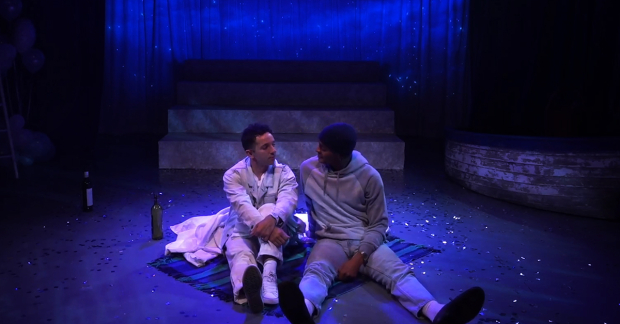Review: Hushabye Mountain (Hope Mill Theatre, online)
Jonathan Harvey’s play returns in a new digital revival

The last major production at the Hope Mill Theatre was a soaring revival of Rent. Now that stage has become a film studio for another play about living and dying through AIDS. While Rent is about fighting through, Jonathan Harvey's Hushabye Mountain is about the agonising aftermath. Nick Bagnall's production is less accomplished, but is told with tender and charismatic performances.
The play begins at the end of Danny's life. While Jodie Prenger sings a soothing lullaby to twinkling chimes, he's guided out of hospital and into the "celestial waters" of the sky. It sets up the surreal language the play will use to tell its story of how Danny's boyfriend, friends and mother live with only memories left. The play was written in the same decade as Angels in America, and uses similar fantastical elements and a heaven setting to express the desire to escape the real, away from a nightmare into a dream.
It plays with these themes on a smaller, more personal scale. Whereas Kushner's play depicts characters reckoning with ethereal forces to plead for more life and the end of suffering, here they're manifestations of Danny's personality. Prenger uses her talent creating larger-than-life personas to embody Judy Garland. Her excitable Southern vocal pitch and sparkly black cardigan — glistening like moonlight on the ocean — reflects Danny confronting a crisis with flamboyant outward projections.
Jocelyn Meall's set shows how the characters are held in this limbo of suspended dreams, with floating balloons and chairs hanging on walls. Other furniture is mobile, with baths and empty doorframes suddenly whisked around — nothing is rooted or grounded, immortal or fixed. Those Danny leaves behind pass between life and death just as he waits to pass into heaven. Anonymous figures are seen in the background beside empty hospital beds, both the after life and wider AIDS crisis surrounding the characters.
Layton Williams encapsulates this sense of flux and of being haunted, spurting out terse replies and always darting his head, reeling from and destabilised by his lover's death. He and Nathan McMullen are endearing without forcing sympathy, capturing the cruel irony of being buoyant with youth while tenderly cherishing their final moments together. McMullen's quietly reflective face seems to cushion emotion, softening his boyfriend's desperately raging love into a warm caressing glow.
Although the cast is strong, there are slightly too many characters which don't fully cohere. Connor's subsequent boyfriend Ben, for example, is fairly limited to righteous anger. Meanwhile Prenger plays Danny's mum as Cilla Black, detracting from the complexity of her conflicting love and disgust towards her gay son. It also seems a little too neat that her roles are used to provide answers, clarity and perspective for characters of a community which severely lacked this kind of resolution or understanding.
The scenes are also a little irregular and the dramatic peaks less defined, such as the revelation of Danny's diagnosis in Act 1 erupting into a screechy argument made more frantic by the camera constantly shifting focus. But ultimately the play's about this kind of messy pain, and leaves you with a sense of journey and recovery to match towering plays about the AIDS crisis.












